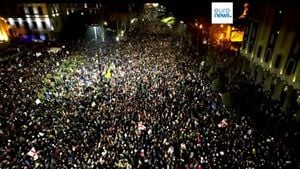A charred lorry, empty tear gas shells, and posters of former Prime Minister Imran Khan marked the aftermath of intense protests led by his wife, Bushra Bibi, which plunged Islamabad, the capital city of Pakistan, headlong back to politically charged tensions. Just days before, Bibi, cloaked in traditional attire, stood atop a shipping container rallying thousands of supporters of the Pakistan Tehreek-e-Insaf (PTI) party, demanding her husband’s release from prison. Imran Khan, the cricketer-turned-politician, had been serving time on charges he vehemently claims are politically driven. Bibi’s vocal presence, her assertive proclamations echoing through the crowds, created what many dubbed her political debut, marking her transition from relative obscurity to the forefront of Pakistani politics.
On the fateful Tuesday afternoon, Bibi's call to the masses drew them to D Chowk, the heart of Islamabad’s governmental universe, where she declared, “We won’t go back until we have Khan with us.” With her words ringing through the air, it was apparent the atmosphere was charged with determination, ready to push past barricades and teargas, but as the dawn of the following day broke, Bibi and the throngs of protesters had seemingly evaporated, leaving only chaos behind.
What transpired during those dark hours remains murky. Eyewitnesses recounted the sudden loss of power plunging the area, famously activated for its governmental significance, deep within darkness. “Everyone was running for their lives,” recounted Samia, one witness, her voice trembling as she recounted the horror of holding her wounded husband on the pavement amid the chaos. Gunshots rang out over screams, and soon the narrative of peaceful protest transitioned inexplicably to one of desperation and violence.
The unrest began after days filled with tear gas and barricaded paths leading to their destination. Protesters, primarily PTI supporters, reached D Chowk late Tuesday afternoon, ignited by Khan’s calls from his prison cell where he’s held on multiple charges. The choice of location was significant; this was where Khan had once led successful protests. Bibi, who had been largely out of the political limelight until now, seemed intent on making her mark, though her future remained uncertain.
Many questioned her unexpected role at the forefront. Bibi, who had recently seen her own release from prison, following charges linked to her husband, displayed new-found vigor. Little was known about her prior political inclinations except her reputation as a faith healer, which had drawn Khan to her years ago. Her sudden emergence sparked discussions – was she strategically maneuvering to maintain the PTI's presence, or was it merely poetic of her affection for Khan?
While many supporters rallied behind her, some noted the conflict it ignited with Khan’s long-standing critique of dynastic politics. Bibi had always preferred the background, but the severe political climate, lit by attacks and the desperation for Khan's release, birthed this new chapter, elevationally charged with expectations. But clarity was short-lived. Just after the blackout, law enforcement responded with aggressive force, sparking mayhem.
With tear gas filling the air and police storming through, people dispersed, and chaos dominated; videos surfaced showing Bibi switching vehicles and leaving the riot zone. Her vessel was soon set ablaze by unknown assailants, and by the dawn of the next day, authorities reported all protesters had vacated.
Eyewitness accounts painted scenes of disorder, shouting auctioneers racing for safety under the barrage of gas and live rounds. Witnesses, like Amin Khan, endeavored to rally others with fervor, stating, “Either I will bring back Imran Khan, or I will be shot.” On the opposite side, security officials claimed they had fired warning shots, contradicting outrage over the scale of force used during the protests.
Despite authorities denying any acts of brutality against protesters, local hospitals catalogued numerous injuries from gunfire. At least five individuals were confirmed dead as the toll began to manifest through anxious hospital reports.
Authorities stated they apprehended hundreds, some of whom remain unaccounted for. Among those tracked down, Bushra Bibi vanished. Supporters expressed both ire and empathy. “She abandoned us,” lamented one member of the PTI, reflecting discontent directed at her apparent exit. Yet, others ardently defended her absconding from turmoil, claiming leaders had insisted she remove herself from danger.
Political analysts weighed her actions heavily, with some asserting, “Her exit damaged her political career before it even started.” Bushra, meanwhile, remained unperturbed and overshadowed by allegations of her motives. Political circles speculated whether her initial moves aligned with desires for personal political power. Many believe she serves primarily to keep the gears of PTI rolling, firmly anchored by her deep-rooted trust and bond with Khan.
Her role during this turbulent march seemed underscored by her connections with many PTI supporters who felt she might be their sole lifeline to Imran Khan. “She is the one who truly wants to get him out,” said local resident, expressing the common sentiment within Khan’s dedicated base.
Born Bushra Riaz Watto, she transitioned from her previous life, embracing the title Bibi after marrying Khan, establishing herself as a leader among Pakistan’s Sufi community. Although she had shunned the public glare for many years, her appearance at the frontline marks a stark change, marking what could evolve from personal to political aspirations.
Bibi symbolizes resilience interwoven with deep-rooted traditions. Her husband revered her not as merely his spouse but as his “spiritual leader.” This intertwines their narratives, as she draws from mystical teachings helping guide Imran Khan's vision for Pakistan, which has increasingly become tumultuous.
Despite the bantering of analysts and supporters alike, the overarching truth points to the grueling battles yet to come. The fire initiated by Bibi’s protests and her husband’s imprisonment continues to fuel dissent within the nation. The question lingers—will she cultivate the momentum amassed from the protests, or will the ceaseless pressures of political life extinguish her newfound influence?
These bold political endeavors are mere reflections of the power struggle enveloping Pakistan under Khan’s party. Further events are anticipated, primarily as the nation clings tightly to the narrative through the arduous political storm swirling through its leadership. The cracks of democracy vibrate beneath the fervor of the protests, with many rallying both for and against the focal point of these events—Imran Khan's leadership.
The events following Bushra Bibi and her political undertones are visibly emblematic of broader societal shifts within Pakistan. They reflect the need for changes fueled by aspirations for civil rights and governmental accountability. Will her dynamic participation culminate positively, giving rise to substantial change, or will the turbulent backdrop continue to dictate Pakistan's political fate? Only time will ascertain the effect of these tumultuous days, and whether Bibi can ascend from behind the spotlight, merging the religious and political echelons with her husband’s visionary narrative.



